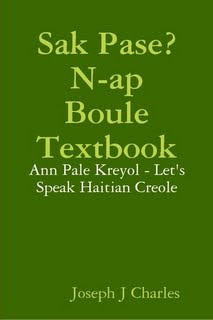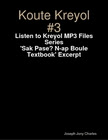You can find this booklet at the following sites. (Pueden encontrar este libro en) http://aprenderkreyolhaitiano.blogspot.com, http://urbanebookspublishing.blogspot.com, http://urbanbookspublishing.blogspot.com
Madan Cherilis Granpanpan antre nan klinik la avèk pitit fi li – Mrs. Cherilis Granpanpan entered the health clinic with her daughter – La Señora Cherilis Granpanpan entró la clínica de salud con su hija Sekretè-a ap poze-l kèk kesyon avan mis la oswa doktè-a wè-l – The clerk is asking her a few questions before the nurse or the doctor sees her – La oficinista le hace algunas preguntas antes de que la enfermera or el doctor la mira
“Bonswa.” – ”Buenas Tardes / Buenas noches / Hola ” – “Good Afternoon / Hello” ***(Bonswa – Good afternoon/Good evening – Buenas Tardes/Buenas noches. Bòn nwi se usa al despedirse. Bòn nwi is Good night / Buenas noches. Lè-w ou fin pale, ou pare pou pati, ou di bòn nwi. Alo – Hola - Hello)****
“Bonswa. ” – “Good afternoon – “Buenas Tardes”
“Ki jan m kapab ede ou ? Ou gen yon randevou?” Sekretè-a mande. – “¿En qué puedo servirle? Tiene una cita ? ” pidió la oficinista – “How can I help you? Do you have an appointment? ”
“Wi madmwazèl. M gen yon randevou pou tèt mwen. Men pititfi-m nan pa gen yonn”
“Si Senorita. Tengo una cita para mi. Sin embargo, mi hija no tiene una.” – “Yes, miss. I have an appointment for myself. But my daughter does not have one.”
“Ou genyen yon batistè?” - ¿Tiene ud. un acta de nacimiento ? ” – “Do you have a birth certifícate?”
Madan cherilis bay sekretè-a batistè-a – Señora Cherilis entregó el acta de nacimiento a la empleada de oficina. – Mrs. Cherilis handed the birth certifícate to the clerk “Pou anrejistre pititfi ou la, m bezwen dosye lekòl li.” – “Para inscribir a su hija, necesito su récord escolar.” – “To sign up your daughter, I need her school records.”
“M pa gen dosye lekòl li. M gen kanè-l.” – “No tengo su récord escolar. Tengo sus calificaciones.” – “I do not have her school records. I have her report card.”
“Ki kote ou rete? Sekretè-a mande. “Ki adrès ou?” – “¿Dónde vive ud.? Pidió la funcionaria. “¿Cùal es la dirección de su domicilio? ” – “Where do you live?” asked the clerk. “What’s your address.”
“M pa konn adrès mwen. M fèk vin rete nan yon kay nèf bò isitla (M fèk bwote bò isitla).” – “No se mi dirección. Acabo de mudarme por acá.” - “I do not know my address. I have just moved into a new home over here.”
Madan Cherilis vire gade pititfi-l la. Li vle mande-l èd, si-l sonje adrès kay la. – Sra. Cherilis dió vuelta para mirar a su hija. Querría pedirle por ayuda, que si se acuerda de la dirección del domicilio.” – “Mrs. Cherilis turned to look at her daughter. She wanted to ask for help, whether she remembered the address of the new home.”
“Eske ou genyen yon bòdwo pou dlo oswa kouran nan valiz ou?” sekretè biwo a poze-l kesyon sa-a. – “¿Tendrà la cuenta de uno de los servicios públicos, cuenta de agua or de electricidad en su bolsa?” le preguntó la oficinista – “Do you have any utility bill, water or electricity bill in your purse?” asked the clerk.
Madan Cherilis yon ti jan santi-l jennen. Li frustre. – Sra. Cherilis se siente un poquito ansiosa, nerviosa. Se frustró. – Mrs. Cherilis felt embarassed and anxious. She was frustrated. “Poukisa ou ap mande-m bagay sa yo? Poukisa ou ap poze-m kesyon sou lavi prive-m konsa? ” –
“¿Porqué me pide por todas estas cosas? Porqué me hace preguntas sobre mi vida privada?” – “Why are you asking for all these things? Why are you questioning my private life?”
Lè sekretè- a wè madan Cherilis tonbe ankolè, li eseye desann vwa-l pou-l ka kalme-l. Li sispann poze kesyon pou yon tikadè – Cuando la oficinista observó que Sra. Cherilis se puso enojada, trató de bajar su voz para poder calmarla por un rato – When the clerk saw that Mrs. Cherilis got mad, she tried to lower her voice in order to be able to calm her down for a while.
Madan Cherilis se yon dam ki gen move jan. Li kanpe byen kin pou-l kòmanse vide mo sal sou sekretè-a. L-ap gade adwat. L-ap gade agosh. – La Sra. Cherilis es una senora grosera. Estuvo lista para verter sus palabras feas a la empleada de oficina. Miró por todas partes, en la derecha e en la izquierda – Mrs. Cherilis is a woman with bad social manners. She stood ready to start pouring down the inventory of her dirty words to the clerk.
Pititfi Madan Cherilis la konnen manman-l pa betize ak moun. Li konnen ki sa-l ka fè nan klinik la. Li mande manman-l pou-l rete trankil. Li wè sekretè-a pa-t di-l anyen ki pou ta fè-l fache konsa – La hija de la Sra. Cherilis sabe que su madre no juega con la gente. Ella sabe lo que puede hacer en la Clínica de salud. Le pidió que se quedara muy tranquila. La hija observó que la empleada de oficina le dijo nada para hacerle tan enojada.
Obtengan todo el texto al comprar este libro. Get all the text of this story by purchasing a copy with one of these links
You can find this booklet at the following sites. (Pueden encontrar este libro en) http://aprenderkreyolhaitiano.blogspot.com, http://urbanebookspublishing.blogspot.com, http://urbanbookspublishing.blogspot.com, http://haitiancreolemp3.libsyn.com, http://creolechildrensbooks.blogspot.com
Get a copy "Vwala Se Te Yon Fwa...." at Smashwords.com now.
Get a copy of "Short Conversations and Dialogues: Vwala Se Te Yon Fwa" as a Nook Book(ebook)









































